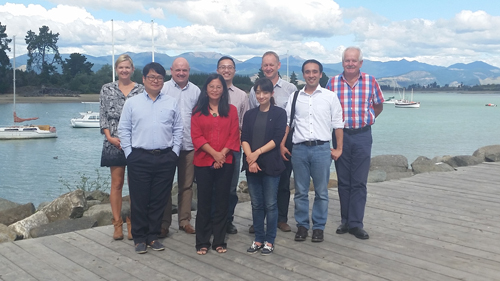Although the packaging has changed over the years, Juicies has proved to be one of the more enduring brands in New Zealand’s F&B sector. We trace the progress of this iconic product and its Nelson-based manufacturer.
By Glenn Baker.
Tasman Bay Food Group is celebrating 30 years of business this year. Theirs is a success story built around a simple product concept – frozen fruit juice – made from fruit largely sourced from the surrounding Nelson region. The Juicies brand has become an inter-generational icon.
The business was established when Brian Hirst of Tasman Bay Juice Company, Colin Robinson of Robinson Brothers and Tony Smith joined forces to grow a business marketing fruit juice products – at the time the main product on offer was the three-litre ‘Bag in Box’.
However, with New Zealand’s challenging and competitive grocery environment, the founders decided to diversify and developed the first Juicies product.
“Juicies were initially sold to school canteens, which then opened up new opportunities to sell a range of healthier food and beverage products in schools,” says Marina Hirst Tristram, executive director, operations, for Tasman Bay Food Group, speaking from the purpose-built factory in Brightwater.
Over the years the company milestones have come thick and fast. It has won numerous local, national and international awards, and its brands have featured strongly at the New Zealand Food Awards – starting in 1991 when it took out the Creativity and Fruit & Vegetables categories, right up to the 2015 Awards, when it won the Business Innovation and Export Innovation categories.
“Those awards are evidence that we’re a professional business and they are very useful with our current export customers. They also help to develop conversations with new contacts,” says Marina.
“It’s a great ‘sense check’ for us that we’re getting somewhere with our strategy and makes us look back on what we’ve achieved over the past two or three years. It’s great for our team to be recognised for their efforts.”
In 2013 Tasman Bay Food Group took their 'retro' Juicies product and reinvented it.
Juicies Tubes has been the company’s key export product ever since “because it is unique and value-added”. “Now our strategy is to focus almost solely on developing new markets and strengthening existing markets for this product,” says Marina.
“We’re currently exporting to Australia, Taiwan, Singapore, UAE and South Korea. We’ve also developed distributor relationships in the UK, Japan and Hong Kong, so we will be exporting to those markets by February 2016.
“We would love to export to North America, so at the moment we are very focused on building our networks there too.”
Marina says, other than Juicies, Tasman Bay Food Group also has a niche market in manufacturing long life fruit bars for military ration packs. These are being exported mainly to Asia.
There is a subsidiary in Australia, used to supply the Juicies, Moosies (milk freeze) and healthier Go! Cookie products to Australian schools.
“Juicies and Moosies are very popular in New Zealand schools, so Australia was the obvious market to export them to initially,” says Marina. The company appointed its first Australian sales rep in Sydney in 2006, and a second rep in Melbourne in 2009, the same year it began supplying Juicies to Costco, an international supermarket chain.
“Original Juicies have a lot of competition in Australia so we’ve found more success with Moosies, which are healthier and better value than the Aussie competition.
“We launched Juicies Tubes in Australian schools to eventually replace Original Juicies and this is beginning to work. Although the product is more expensive, its unique – that’s what sets it apart from the competition and is what consumers are looking for.”
Juicies Tubes are popular in export markets because they’re made from fruit juice, continues Marina. “There’s no added sugar or colours.
“We did a lot of research on the packaging to ensure it worked for the product and looked great. We had previously tried to export Original Juicies but three objections kept surfacing: too hard to open, too hard to bite through and too cold on the hands.
“Our new packaging and product resolved these objections.”
It’s about relationships
Tasman Bay Food Group has worked hard to build the right relationships in markets.
“Our distributors are as passionate about the product as us,” says Marina. “We teach them all there is to know about Juicies Tubes so they can do a great job at selling them.
“We also take a multi-channel approach – schools, convenience stores, events or grocery retailers. Every market is different; some channels work, others don’t, depending on the market.”
Marina says the strategy is to work with one master distributor in each market.
“We make sure we find the right distributor first because the relationship is so important. We need to trust our distributors to do the right things with our brand. We work closely with them to develop marketing strategies – across TV, through to sales promotions, through to events.”
Today Tasman Bay Food Group’s focus is squarely on developing Juicies Tubes. In 2014, the first year of Juicies Tubes production, more than 3,500,000 were exported. Yet Marina reports they’ve barely scratched the surface of their current markets.
“We still have a long way to go to achieve the volume we want and we need to make these markets successful in the long term. We’ve already developed, and are ready to launch, two new variants. So watch this space.”




